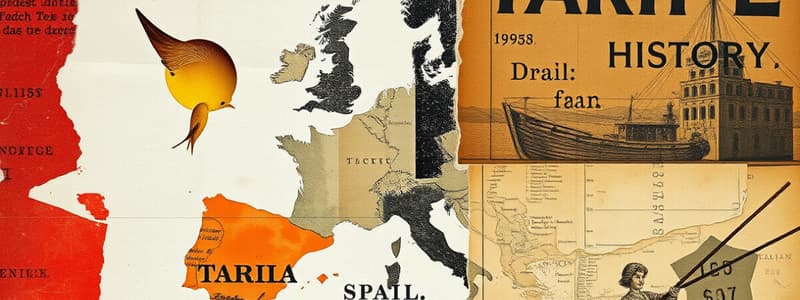Podcast
Questions and Answers
What is a revenue tariff primarily designed to do?
What is a revenue tariff primarily designed to do?
- Impose high duties on products from unfair tariff countries.
- Facilitate the ready importation of goods with lower duty rates. (correct)
- Keep certain imports out of the domestic market.
- Raise domestic prices on certain imports.
Which term refers to the customary tolls or dues paid by merchants?
Which term refers to the customary tolls or dues paid by merchants?
- Tariff
- Protective Tariff
- Bargaining Tariff
- Customs (correct)
What is the primary purpose of a protective tariff?
What is the primary purpose of a protective tariff?
- To prevent certain imports from competing with domestic products. (correct)
- To ensure all goods can be imported easily.
- To collect high revenues from imported goods.
- To serve as a bargaining tool with other countries.
What does a bargaining tariff primarily include?
What does a bargaining tariff primarily include?
What does the modern customs tariff represent?
What does the modern customs tariff represent?
What historical figure is associated with the naming of Tarifa?
What historical figure is associated with the naming of Tarifa?
What was the primary purpose of establishing a settlement at Tarifa?
What was the primary purpose of establishing a settlement at Tarifa?
How did the term 'tariff' evolve in different languages?
How did the term 'tariff' evolve in different languages?
Which of the following is not a reason Why tariffs are used by governments?
Which of the following is not a reason Why tariffs are used by governments?
What geographic feature made Tarifa a strategic location historically?
What geographic feature made Tarifa a strategic location historically?
What was a consequence of the strategic position of Tarifa?
What was a consequence of the strategic position of Tarifa?
Which of the following languages has a word derived from 'tariff' meaning 'price list'?
Which of the following languages has a word derived from 'tariff' meaning 'price list'?
What role did tariffs play in protecting local businesses?
What role did tariffs play in protecting local businesses?
Flashcards are hidden until you start studying
Study Notes
Origin of the Term "Tariff"
- The term "tariff" comes from the town of Tarifa in southern Spain, named after Tarif ibn Malik, an Arab military commander.
- Tarifa's strategic location near the Strait of Gibraltar allowed for control over maritime trade between the Mediterranean Sea and the Atlantic Ocean.
- Established by the Moors, Tarifa became a settlement that later facilitated the imposition of fees on passing merchants, leading to the practice of tariffs.
Historical Context
- A Berber commander conducted a reconnaissance mission to the Iberian Peninsula in 710 AD, influencing the naming of Tarifa.
- Pirates capitalized on Tarifa's geography, extracting fees based on a fixed rate from merchant ships traversing the Strait of Gibraltar.
Etymology of "Tariff" in Different Languages
- The term "tariff" spread from English merchant trade to other languages:
- French: "tarife" (rate)
- Spanish: "tarifa" (rate book)
- Arabic: "tariff" (notification)
- Italian: "tariffa" (price list)
- Portuguese: "tariffa" (schedule)
- In different languages, it evolved to pertain to pricing or rates.
Functions of Tariffs
- Tariffs are used by governments to regulate trade and collect revenue by making foreign goods more expensive.
- They protect local businesses by helping them compete against imported products.
- A tariff functions as a list or schedule outlining the duties owed by imported or exported goods.
Types of Tariffs
- Revenue Tariff: Features low rates to facilitate the easy import of goods and collection of duties.
- Protective Tariff: Imposes high rates to restrict certain imports, thereby benefiting local industries by reducing competition.
- Bargaining Tariff: Contains provisions for negotiating higher duties on products from countries with unfair tariff policies.
Customs and Modern Tariffs
- "Customs" refers to the total duties paid by merchants on goods entering or leaving markets.
- The Modern Customs Tariff is a systematic arrangement of duties imposed on goods crossing political borders.
- Tariffs can also be classified based on their purpose, affecting how commodities are treated in international trade.
Studying That Suits You
Use AI to generate personalized quizzes and flashcards to suit your learning preferences.



